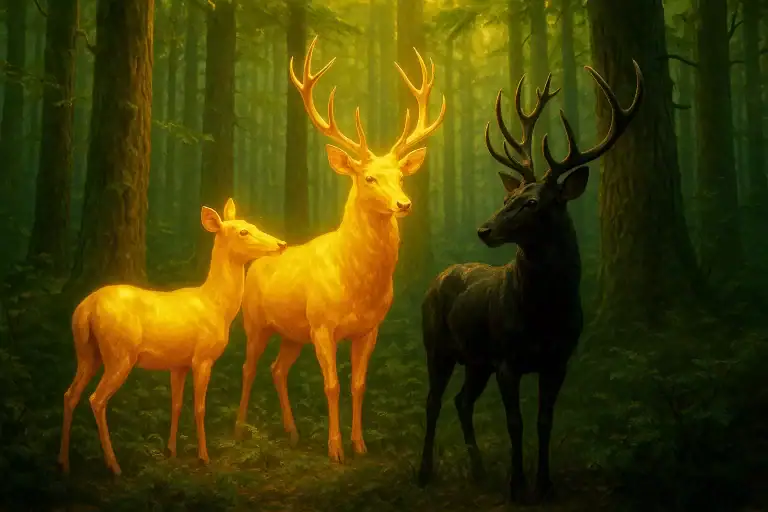LAKKHANA MIGA JĀTAKA
-
Save
This story was told by the Master in the Bamboo-grove near Rājagaha about Devadatta.
On the occasion now in question, Devadatta, having failed to carry the Five Points he had pressed for, created a schism in the Brotherhood and went off with five hundred brethren to dwell at Gayāsīsa. Now these brethren came to a riper knowledge; and the Master, knowing this, called the two chief disciples and said:
“Śāriputta, your five hundred pupils, who were misled by Devadatta’s teaching and went off with him, have now come to a riper knowledge. Go thither with a number of brethren, preach the Truth to them, enlighten these wanderers regarding the Paths and the Fruits, and bring them back with you.”
They went, preached the Truth, enlightened them regarding the Paths and the Fruits, and the next day at dawn returned with those brethren to the Bamboo-grove. And while Śāriputta was standing there after saluting the Blessed One on his return, the brethren spoke thus in praise of the Elder Śāriputta:
“Sir, very bright was the glory of our elder brother, the Captain of the Truth, as he returned with a following of five hundred brethren; whereas Devadatta has lost all his following.”
“This is not the only time, brethren, when glory has been Śāriputta’s on his return with a following of his kinsfolk; such glory was his also in bygone days. And this is not the only time Devadatta has lost his following; he lost it in bygone days as well.”
The brethren asked the Blessed One to explain this to them. The Blessed One then made clear what had been concealed by rebirth.
Once upon a time, in the city of Rājagaha in the kingdom of Magadha, there ruled a certain king of Magadha. In his days the Bodhisatta was reborn as a stag. Growing up, he dwelt in the forest as the leader of a herd of a thousand deer. He had two young ones named Luckie and Blackie. When he grew old, he entrusted his charge to his two sons, placing five hundred deer under the care of each. Thus, the two young stags became leaders of the herd.
At harvest-time in Magadha, when the crops stood thick in the fields, the forests nearby became dangerous for deer. To protect their crops, the peasants dug pitfalls, set stakes, laid stone-traps, and planted snares and other devices, so that many deer were slain.
Accordingly, when the Bodhisatta saw that it was crop-time, he sent for his two sons and said:
“My children, this is the season when the crops stand thick in the fields, and many deer meet their deaths. We who are old will remain here in one place; but you must each lead your herd into the mountains and return only when the crops have been carried.”
“Very well,” said the two sons, and they departed with their herds, as their father had commanded.
Now the men who lived along the route knew well the times when deer took to the hills and when they returned. Lying in wait, hidden in ambush here and there, they shot and killed many. Blackie, being foolish and ignorant of the proper times to travel or halt, drove his herd at dawn and dusk, and even into the outskirts of the villages. The peasants, whether in ambush or out in the open, slew many of his deer. Through this folly, almost all were destroyed, and he reached the forest with but a few survivors.
Luckie, on the other hand, being wise and resourceful, never approached the boundaries of villages. He did not travel by day, nor even at dawn or dusk. Only in the dead of night did he move his herd, and thus he reached the forest without losing a single deer.
For four months they remained in the mountains, not descending until the crops had been harvested. On the return journey Blackie, repeating his former folly, lost the rest of his herd and came back alone. But Luckie, having guarded his deer wisely, brought back all five hundred and appeared before his parents in triumph.
When the Bodhisatta saw his two sons returning, he uttered this stanza in the midst of the herd of deer:
The upright, kindly man receives reward;
Behold Luckie returning with his kin,
While Blackie comes bereft of all his herd.
Thus did the Bodhisatta welcome his son. And after living to a ripe old age, he passed away, to fare according to his deeds.

-
Save
At the close of his lesson, when the Master had repeated that Śāriputta’s glory and Devadatta’s loss both had their parallel in bygone days, he revealed the connection linking the two stories together and identified the Birth, saying:
“Devadatta was Blackie of those days; his followers were Blackie’s following. Śāriputta was Luckie of those days, and his followers were the Buddha’s followers. Rāhula’s mother was the mother of those days, and I myself was the father.”
Source : The Jataka ,Vol 1, trans. by Robert Chalmers, 1895
